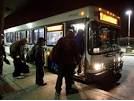|
Saturday, 29 November 2014
quote [ The 22 bus is the only route that runs 24 hours in Silicon Valley and it has become something of an unofficial shelter for the homeless.
They call it Hotel 22. ] A really interesting look at Silicon Valley.
|
Comments
|
rylex said @ 9:10am GMT on 29th Nov
[Score:3]
Real talk. Back when I lived in San Jose, I used to ride and sleep on this bus. There was always at least 5-10 of us riding it late night.
Interesting too see its still utilized. I had figured VTA would have done something about the issue by now. |
|
dolemite said @ 8:00pm GMT on 29th Nov
[Score:2]
And by "done something about the issue" any sane person would mean put another 22 bus in service, or several more.
With property values being too high to make new shelters or low-cost housing possible in the region, the 22 bus seems like a great way to hide safe publicly-subsidized sleeping spaces for the homeless from right-wing assholes who would campaign to shut this resource down. |
|
lilmookieesquire said @ 9:36am GMT on 29th Nov
I've meet a few people, from multiple walks of life, who have casually mentioned they were homeless for awhile. It's lead me to believe it really isn't that rare.
|
|
cb361 said[1] @ 12:22pm GMT on 29th Nov
[Score:2 Informative]
I'm sure I've mentioned on SE multiple times being there for 5 years. In my case I could have mostly avoided it, but it was to pay debts and avoid going bankrupt. I could deal with that situation better than a lot of people would have, but it's still very very nice to own a bed now.
I do remember feeling jealous of people on the night-buses that drove past though. |
|
rylex said @ 7:44pm GMT on 29th Nov
[Score:2 Interesting]
I have been homeless off and on from about age 16 (in my 30's now). My homelessness has ranged from sleeping under a bridge, setting up tents in golden gate park, being a gypsy in my car and couch surfing.
And after all these years, i can say with certainty, some of the best and most free times in my life have been when I was out on the streets. If I had been born 70 years earlier, I am positive I would have been a hobo. |
|
cb361 said @ 1:05pm GMT on 30th Nov
I didn't like being in the situation, but there was a part of me that relished the freedom, yes. My mother's father's family were travelling Welsh tinkers, and there's something of the gypsy life that appeals to me. It's in my blood. I'm sure that most people on the street through bad luck don't even have that comfort though.
|
|
arrowhen said[1] @ 5:18pm GMT on 29th Nov
[Score:1 Informative]
I've never been living in a cardboard box homeless, but there have been times where "home" was a friend's couch or a storage unit.
|
|
rylex said @ 8:26pm GMT on 29th Nov
[Score:1 Underrated]
Interesting sidenote about Silicon Valley.
My grandparents, who live in San Jose, are about to lose their home that they have owned since the 1980's. They were middle class while I was growing up. My grandfather was a head engineer at Lockheed, he retired in the early 90's. My grandmother worked at Fairchild Semiconductor until they were sold in the late 80's. The rising cost of homes in the area, due to the Net Bubble and the new tech companies, has left their retirement funds unable to cover their property tax. I have a few friends whose parents are in similar predicaments. Their parents are in their 60s and unable to enter retirement for fear of not paying the bills. |
|
lilmookieesquire said @ 9:37pm GMT on 29th Nov
We have prop 13 which freezes the property tax for people who have owned the property since x years (I forgot) but our new neighbors pay like 30k a year for just property tax.
|
|
rhesusmonkey said @ 5:25am GMT on 2nd Dec
"lose their home" or "sell their home for a ridiculous profit"?
The former sounds like eminent domain or that they are somehow not able to sell the property - if the issue is they don't want to sell their home that is separate. I have visions of their house full of balloons ready to lift off on an adventure. |
|
lilmookieesquire said @ 6:09pm GMT on 29th Nov
Wow I have old school friends arguing about this on fb. Looks like it hit a nerve. Basically one guy is saying the 22 has been around for ages and is nothing new and the other is saying they've missed the point my of the article: how much the area has changes as can be represented via the busses in the area.
|
Post a comment
[note: if you are replying to a specific comment,
then click the reply link on that comment instead]You must be logged in to comment on posts.

